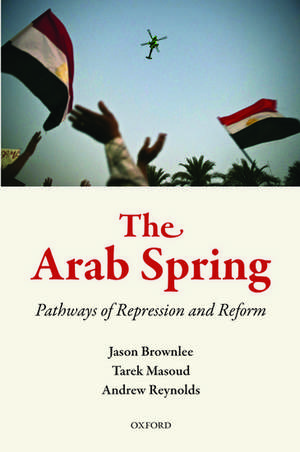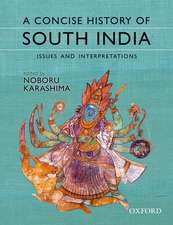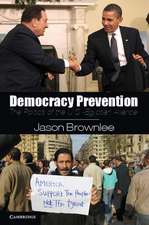The Arab Spring: Pathways of Repression and Reform
Autor Jason Brownlee, Tarek Masoud, Andrew Reynoldsen Limba Engleză Paperback – 18 feb 2015
| Toate formatele și edițiile | Preț | Express |
|---|---|---|
| Paperback (1) | 262.37 lei 31-37 zile | |
| Oxford University Press – 18 feb 2015 | 262.37 lei 31-37 zile | |
| Hardback (1) | 733.06 lei 31-37 zile | |
| Oxford University Press – 19 feb 2015 | 733.06 lei 31-37 zile |
Preț: 262.37 lei
Nou
Puncte Express: 394
Preț estimativ în valută:
50.22€ • 54.57$ • 42.21£
50.22€ • 54.57$ • 42.21£
Carte tipărită la comandă
Livrare economică 10-16 aprilie
Preluare comenzi: 021 569.72.76
Specificații
ISBN-13: 9780199660070
ISBN-10: 0199660077
Pagini: 340
Ilustrații: black & white illustrations
Dimensiuni: 165 x 234 x 18 mm
Greutate: 0.52 kg
Editura: Oxford University Press
Colecția OUP Oxford
Locul publicării:Oxford, United Kingdom
ISBN-10: 0199660077
Pagini: 340
Ilustrații: black & white illustrations
Dimensiuni: 165 x 234 x 18 mm
Greutate: 0.52 kg
Editura: Oxford University Press
Colecția OUP Oxford
Locul publicării:Oxford, United Kingdom
Recenzii
This is the best book yet on why the Arab Uprisings proved unable to bring desired changes. Deftly blending theories of regime change with attention to the details of the uprisings and post-breakdown efforts to restore order, this authors clearly show why aspirations for democracy were so often disappointed.
The uprisings collectively described as the Arab Spring are the most dramatic political events, to date, in our young century. If we hope to understand this critical region, our current political era, and the prospects for democracy to take root in unfamiliar soil, we need to make sense of the Arab Spring. Brownlee, Masoud, and Reynolds are uniquely equipped for this task, bringing expertise on the history, culture, economy, geopolitics, and institutions that drove the uprisings and the politics that followed. The book reveals patterns amid complexity and separates solid evidence from speculation. We will be debating the Arab Spring for generations and updating how we understand it. But Brownlee, Masoud, and Reynolds provide the foundation. All the scholarship to come will build on this book.
The Arab Spring: Pathways of Repression and Reform is one of the most comprehensive accounts of the politics underlying the Arab Spring. This authoritative and well-researched book is both theoretically rigorous and empirically rich. The authors have put together a magnificent account of the Arab Uprisings. Anyone interested in acquiring a sophisticated understanding of these events must read this book.
This is quite simply the best analysis of the Arab Spring that I have read. It draws on a wealth of social science and comparative history to evaluate the various reasons for the many failures and few successes in the regionâs recent political development. The conclusions are thoughtful, highly intelligent, and mostly depressing. But as a work of scholarship and in its relevance to real world issues, this is extremely impressive.
Brownlee, Masoud, and Reynolds have written the first definitive account of The Arab Spring, setting a high standard by which all future works will be compared. Drawing on their theoretical talents and extensive regional knowledge, Brownlee, Masoud, and Reynolds offer a sophisticated argument for far reaching legacies of authoritarian rule, as well as a compelling explanation for different trajectories from authoritarian breakdown in the Arab world after 2011. Arab Spring will become must reading for all courses on the Middle East and comparative politics more generally for years to come.
By far the most ambitious and convincing analysis of the recent Arab uprisings in comparison to failed and successful democratic transitions in the rest of the world.
This is the most systematic and analytically rigorous book on the Arab uprisings to date. Even the process of defining the questions that can and cannot be answered is based on a careful analytical exercise. The core arguments, which aim to explain why leaders were or were not ousted and why institutional change did or did not occur in the region, are convincing and well supported theoretically and empirically. Through meticulous inductive analyses, Brownlee, Masoud, and Reynolds move beyond the less historically grounded and more âproximateâ accounts that have proliferated since the uprisings, highlighting the structural factors that permitted or constrained the behavior of elites and citizens during and after the uprisings.
This is the book with which everyone interested in the Arab upheavals of 2011 must now grapple. It puts forward parsimonious and counter-intuitive explanations for the different results we see across the Arab world from those momentous events, and grounds those explanations in sophisticated and informed empirical analysis. It engages with larger theoretical debates but never loses its focus on the Arab Spring itself. It is a perfect teaching book, because it makes big arguments in a clear way. It will define the social science debate on the Arab Spring.
The Arab Spring: Pathways of Repression and Reform explains why the optimism that developed in 2010 and 2011 proved to be unjustified. In its analysis of the delayed democratic transition in most of the Middle East, it is incisive, parsimonious, compelling, and---perhaps above allâsobering.
The Arab Spring represents an important step forward in the systematic, theoretical analysis of the political turbulence which rocked the region beginning in late 2010. Placing the region firmly in comparative perspective and rigorously assessing the limited outcomes of the protest wave, The Arab Spring offers a parsimonious explanation of these events which establishes a new standard for political scientists.
this is a must read reference
The uprisings collectively described as the Arab Spring are the most dramatic political events, to date, in our young century. If we hope to understand this critical region, our current political era, and the prospects for democracy to take root in unfamiliar soil, we need to make sense of the Arab Spring. Brownlee, Masoud, and Reynolds are uniquely equipped for this task, bringing expertise on the history, culture, economy, geopolitics, and institutions that drove the uprisings and the politics that followed. The book reveals patterns amid complexity and separates solid evidence from speculation. We will be debating the Arab Spring for generations and updating how we understand it. But Brownlee, Masoud, and Reynolds provide the foundation. All the scholarship to come will build on this book.
The Arab Spring: Pathways of Repression and Reform is one of the most comprehensive accounts of the politics underlying the Arab Spring. This authoritative and well-researched book is both theoretically rigorous and empirically rich. The authors have put together a magnificent account of the Arab Uprisings. Anyone interested in acquiring a sophisticated understanding of these events must read this book.
This is quite simply the best analysis of the Arab Spring that I have read. It draws on a wealth of social science and comparative history to evaluate the various reasons for the many failures and few successes in the regionâs recent political development. The conclusions are thoughtful, highly intelligent, and mostly depressing. But as a work of scholarship and in its relevance to real world issues, this is extremely impressive.
Brownlee, Masoud, and Reynolds have written the first definitive account of The Arab Spring, setting a high standard by which all future works will be compared. Drawing on their theoretical talents and extensive regional knowledge, Brownlee, Masoud, and Reynolds offer a sophisticated argument for far reaching legacies of authoritarian rule, as well as a compelling explanation for different trajectories from authoritarian breakdown in the Arab world after 2011. Arab Spring will become must reading for all courses on the Middle East and comparative politics more generally for years to come.
By far the most ambitious and convincing analysis of the recent Arab uprisings in comparison to failed and successful democratic transitions in the rest of the world.
This is the most systematic and analytically rigorous book on the Arab uprisings to date. Even the process of defining the questions that can and cannot be answered is based on a careful analytical exercise. The core arguments, which aim to explain why leaders were or were not ousted and why institutional change did or did not occur in the region, are convincing and well supported theoretically and empirically. Through meticulous inductive analyses, Brownlee, Masoud, and Reynolds move beyond the less historically grounded and more âproximateâ accounts that have proliferated since the uprisings, highlighting the structural factors that permitted or constrained the behavior of elites and citizens during and after the uprisings.
This is the book with which everyone interested in the Arab upheavals of 2011 must now grapple. It puts forward parsimonious and counter-intuitive explanations for the different results we see across the Arab world from those momentous events, and grounds those explanations in sophisticated and informed empirical analysis. It engages with larger theoretical debates but never loses its focus on the Arab Spring itself. It is a perfect teaching book, because it makes big arguments in a clear way. It will define the social science debate on the Arab Spring.
The Arab Spring: Pathways of Repression and Reform explains why the optimism that developed in 2010 and 2011 proved to be unjustified. In its analysis of the delayed democratic transition in most of the Middle East, it is incisive, parsimonious, compelling, and---perhaps above allâsobering.
The Arab Spring represents an important step forward in the systematic, theoretical analysis of the political turbulence which rocked the region beginning in late 2010. Placing the region firmly in comparative perspective and rigorously assessing the limited outcomes of the protest wave, The Arab Spring offers a parsimonious explanation of these events which establishes a new standard for political scientists.
this is a must read reference
Notă biografică
Jason Brownlee is an associate professor of Government and Middle Eastern Studies at the University of Texas at Austin, where he teaches courses on US foreign politics, Middle Eastern politics, and authoritarianism.Tarek Masoud is an associate professor of public policy at Harvard University's John F. Kennedy School of Government, where he teaches courses on comparative political institutions, democratization, and Middle Eastern politics.Andrew Reynolds is an Associate Professor of Political Science at UNC Chapel Hill and the Chair of Global Studies. He received his M.A. from the University of Cape Town and his Ph.D. from the University of California, San Diego. His research and teaching focus on democratization, constitutional design and electoral politics. He is particularly interested in the presence and impact of minorities and marginalized communities.











